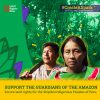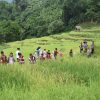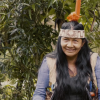The Philippines is one of the most dangerous countries for Indigenous Peoples and human rights defenders. In 2020 alone, the lives of more than 90 Indigenous Peoples and indigenous human rights defenders’ (of which 35 indigenous women) were at risk after being maliciously red-tagged by state forces. As part of the intimidation, persecution, and violence against civil society actors, 33 people were arrested and 14 murdered. In addition to attacks on individuals, 60 indigenous peoples’ organizations, civil society organizations and support groups have also been red-tagged.
Click to tweet our video calling the government of the Philippines to end the criminalisation and red-tagging of Indigenous Peoples.
Stop the red-tagging of indigenous peoples in the Philippines
“Red-tagging” is the branding of individuals and/or groups as members of the Communist Party of the Philippines-New People’s Army (CPP-NPA) – a tool used by the state to silence dissent and justify the attacks, arrests, and killings of Indigenous Peoples and human rights defenders. Read more about why red-tagging is so dangerous.
The Duterte regime’s national security policy, Operational Plan Kapayapaan (peace) now Kapanatagan (tranquillity), aims to transform provinces with communist insurgents to make them “peaceful and ready for further development”. According to the military, 90% of insurgent bases are located in ancestral domains ( the lands, territories and resources of indigenous peoples), thus, indigenous communities are labelled “red areas” and “communist infested.”
As part of this approach, the government created the National Task Force to End Local Armed Conflict (NTF-ELCAC) – which has been primarily responsible for the red-tagging of individuals and groups. It also set up a Comprehensive Local Integration Program (CLIP) which provides funds to “surrendered communist rebels”. Farmers from Eastern Visayas revealed that state agents harassed and bribed them with PHP 140,000.00 (approximately USD 2,896) to sign blank documents and surrender. Similar incidents have been reported in other regions.
President Duterte’s approach is shrinking democratic and civic space, especially for Indigenous Peoples. Red-tagging is a human rights violation that tramples on the constitutional rights of individuals and has become the basis for state agencies to carry out coordinated operations of arrests – at times resulting in extrajudicial killings. Most recently, the Tumandok indigenous community had nine of their members killed and 16 arrests as they protested against the construction of a dam in their ancestral domain.
Indigenous schools shut down by government
The attacks have not spared school-age indigenous children. The government shut down 178 out of 215 Lumad schools, makeshift schools set up in the Mindanao region where indigenous schools have been shut down by the government following allegations of being “breeding grounds for communist rebels”. Over 5,500 Lumad students have been disenfranchised. Most of the remaining schools have halted operations as Lumad indigenous communities continue to experience militarization while students, parents and volunteer teachers are vilified and threatened.
Criminalisation during the Covid-19 pandemic
While the Philippines is in lockdown due to COVID-19, development projects in indigenous areas continue as do the attacks on Indigenous Peoples. To make matters worse, the 2020 Anti-Terrorism Act (ATA) places human rights defenders and Indigenous Peoples at risk with an intentionally broad and vague definition of terrorism. Many forms of dissent or criticism against the government can be branded as terrorist acts, providing government agents with excessive and unchecked power.
The law also creates and authorizes the Anti-Terrorism Council (ATC), appointed by the President to take action against suspected terrorists. The trumped-up charges against Cordillera Peoples Alliance (CPA) Chairperson Windel Bolinget and the arrest of Alternative Learning Center for Agricultural and Livelihood Development (ALCADEV, a Lumad School) volunteer teacher Chad Booc, petitioners questioning the constitutionality of the Anti-Terror Law, highlight the dangers of the law.
WHAT YOU CAN DO
Help activists and organisations in the Philippines call for:
- an independent investigation of the human rights situation by the UN Human Rights Council
- a stop to the red-tagging and vilification of Indiegnous Peoples organisations, communities, leaders and support groups
- the abolition of the NTF-ELCAC
- the dropping of trumped-up charges against indigenous leaders
- Junking the Anti-Terror Law
FIND OUT MORE
International Indigenous Peoples Movement for Self Determination and Liberation (IPMSDL)
Philippine Task Force for Indigenous Peoples’ Rights (TFIP)
Legal Rights and Natural Resources Center – Kasama sa Kalikasan (LRC-KSK)


